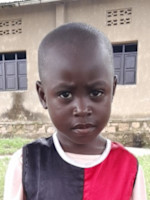

Birthday
July 1, 2020
Age
Age: 5
Gender
Girl


Deline is 5 years old and lives in Rwanda.
I live with my mother and father in the Nyagatare area. The primary language where I live is Kinyarwanda. My mother and father are sometimes employed as farmers. At home, the chores and duties I'm responsible for are animal care and childcare. I like art and/or drawing and ball games. My favourite activity at church is Sunday school. My favourite activities at the centre are playing games and dancing and/or drama. I am in the equivalent of kindergarten. My favourite subject is Art.
Rwanda is a small, landlocked country in the Great Rift Valley of central Africa. Its grassy uplands and many hills have given it the nickname “land of a thousand hills.” Most of this country lies above 1200 metres, and the densely forested slopes of the mountains are home to the famous mountain gorillas, as well as many other kinds of wildlife.
Rwanda's population density is the highest in sub-Saharan Africa. The people of Rwanda are known as the Banyarwanda and have historically been divided into three groups. The Tutsis (15 per cent) were the traditional ruling class in pre-colonial times, while the Hutus (84 per cent) were mostly agricultural workers. The Twa (1 per cent) are pygmies. The Twa are descended from the earliest inhabitants of Rwanda, while it is unclear whether the Hutus and Tutsis constitute different ethnic groups, with the distinction between them being arbitrarily exacerbated during colonial rule. The current government does not encourage distinction between these groups.
Rwanda has been a unified state for many centuries and is one of the few African countries whose borders were not defined by colonial powers. For four centuries, Rwanda was ruled by a Tutsi monarchy until the kingdom became part of German East Africa in 1894, later to be replaced by the Belgian territory of Ruanda-Ulundi. Throughout this time, the Tutsi retained their dominance of local politics until 1959, when Hutus gained control of the government, stripping many Tutsi of their land just before independence in 1962. A Tutsi-led insurrection in 1990 led to bitter civil strife, which culminated in the 1994 genocide against the Tutsi, with an estimated 800,000 people being killed and 2 million fleeing to neighbouring countries. A new constitution was adopted in 1995, and many refugees have since returned, but the country is still healing the from devastating effects of the war and genocide. The country held its first multiparty elections in 2003.

Compassion’s ministry is focused on what we call holistic child development. This means developing children in all the different aspects of their lives—their minds, bodies and relationships—while giving them the opportunity to hear about and experience the love of Jesus from caring local church staff and volunteers.
Absolutely not! We encourage children and families of all faiths and backgrounds to register in our programs and would never require or coerce anyone to convert to Christianity.
Learn MoreToday, children around the world are discovering that poverty doesn’t have to be their future. Help one more do the same by sponsoring with Compassion!

While we're sorry you could not sponsor this specific child, we would love to help you find a different child to sponsor.
Age: